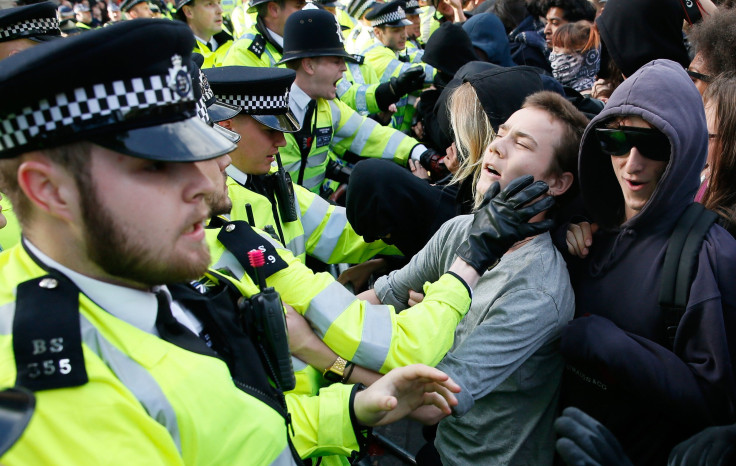London Protests: Violence Feared As Anti-Tory Demonstrations Meet Police

Update as of 5:37 a.m. EDT: Following the Conservative Party's victory in the U.K. general elections, 17 people were arrested in anti-austerity protests near Downing Street in central London, IBTimes UK reported, citing the Metropolitan Police.
A "small minority" of protesters clashed with police and caused disorder, a police official said, according to the report.
Update as of 4:29 p.m. EDT: Five people have been arrested and four officers have been injured during an anti-austerity and anti-Conservative protests that erupted Saturday in the United Kingdom. Four people were arrested for a variety of offenses under the Public Order Act, according to the Telegraph. One person has been arrested on suspicion of assault on police.
Earlier this afternoon, police responded to a spontaneous protest outside Downing Street. Four officers and one police staff member have been injured so far during the protest, The Telegraph reported.
Original story below.
Hundreds of protesters demonstrated Saturday outside Downing Street against Prime Minister David Cameron and his Conservative Party, which won an absolute majority in Parliament in countrywide elections on Thursday. Metropolitan police outfitted with riot gear responded in force, and reports say the standoff has become violent.
Police began “kettling” protesters in the late afternoon local time, a tactic that involves forming strong police lines around a group of protesters and moving in on them to contain them to one area. Some reports claim the police are preventing protesters from leaving the area they have been kettled into. Police brought in mounted officers and vans, raising suspicions there were plans to arrest demonstrators.
Police getting violent, starting to kettle protestors outside Downing Street pic.twitter.com/TZzcXJRHb6
- Shelly Asquith (@ShellyAsquith) May 9, 2015Pushing and shoving between police & protesters in #London. Police hit with ketchup or something. pic.twitter.com/Mgh9SBwknj
- Sara Firth (@Sara__Firth) May 9, 2015It's getting a bit chaotic here in #London at the protest pic.twitter.com/NB4r6gA9LE
- Sara Firth (@Sara__Firth) May 9, 2015Anti-#Conservative and anti-austerity mass rally in #London https://t.co/XpT94e4ClH
- Harry Fear (@harryfear) May 9, 2015London #GE2015 #ToriesOutNow protests - not being reported or acknowledged in mainstream media at all pic.twitter.com/cLKBMNcboO
- Sam England (@samengland) May 9, 2015The protester appear to be a mixed group of Labour supporters, Scottish National Party (SNP) supporters and students. Opposing rallies by Britain’s far-right, controversial English Defense League and their rival Unite Against Fascism were held on Saturday in London, but it is unclear if elements of either rally have melded with the anti-Tory demonstrations.
The United Kingdom was blindsided by the Conservative Party’s comfortable victory on Thursday, after nearly every poll leading up to the election indicated the Tories and their rivals in the Labour Party were neck and neck, neither with enough support to form a majority government. Those polls turned out to be wildly inaccurate, as the Labour Party lost nearly all of the 59 seats in the party’s former stronghold, Scotland, to the SNP and came well short of any victory. That prompted Labour leader Ed Miliband to resign.
Britain’s first-past-the-post election system has attracted criticism, particularly from British liberals, who say it does not accurately represent the will of the people. For example, a landslide Labour victory in Sunderland by 15,000 votes still counts for only one seat, equal to a seat won by the Conservatives by only a few thousand in one of Britain’s more contentious constituencies, and vice versa. The far-right UK Independence Party and the liberal Green Party suffered the worst under this system, the former securing just under 13 percent of votes across the country but winning only one seat in Parliament.
The Conservative Party won 36 percent of the vote, compared with Labour’s 30 percent, but came away with 99 more seats in Parliament, nearly a sixth of all seats. Cameron now has a small but workable majority in Parliament that should allow him to carry on relatively unchallenged with Tory policies for another five years.
© Copyright IBTimes 2024. All rights reserved.












